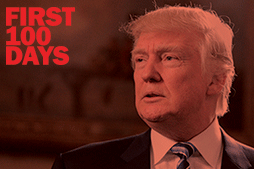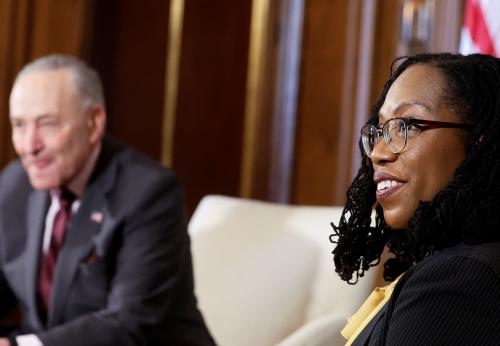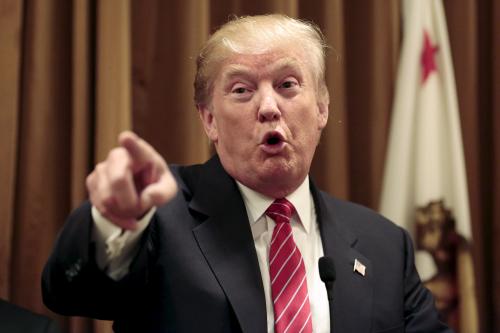Donald Trump was swept into the White House on promises to “drain the swamp” and remake Washington. His commitment to throwing out the old ways of Washington and forging a new, unprecedented path have rattled his opponents and delighted his supporters. However, when it comes to presidential personnel—the selection of political appointees and other staff—the norms, processes, and institutions that are in place are designed to protect the president, his administration, and the American public that depends on effective government.
In other words, Mr. President, when selecting your top advisors, the old ways of Washington may be your best friend.
The nomination of Rear Adm. Ronny Jackson (the long-serving presidential physician) to be Secretary of Veterans Affairs is a prime example of the problems that result when the president refuses to work within those norms. According to reporting, the nomination was put forward with little vetting, suggesting the president’s personal affinity for Jackson, who suggested a change to the presidential diet could allow him to live to be 200 years old, overwhelmed traditional background check and interview processes.
Uncovering the truth about Jackson might not have been difficult at all, had the president, the chief of staff, and the Office of Presidential Personnel simply asked. Current and former White House staffers, the United States Secret Service (who, during the Obama administration, allegedly needed to intervene when Dr. Jackson became belligerent while under the influence of alcohol on the job), or the doctor himself could have told them whether there were any behaviors or allegations of behaviors in his past that could be damaging to the president or the administration.
Much like a doctor, the primary role of a political appointee is ‘first, do no harm’—to the president, that is. Second, an appointee must be an effective administrator in the capacity for which he or she is selected. Mere allegations of misconduct, even if untrue, can create significant headaches for a White House. It is the job of the Office of Presidential Personnel to identify a pool of qualified applicants and weed out the ones who will cause political controversies for the White House.
The traditional vetting process for presidential appointees can be a long and arduous one. Considerations of personal character, controversy, financial dealings, qualifications, and confirmability in the Senate are among the qualities that must be thoroughly examined. That is particularly true for cabinet-level officials who will sit in the line of presidential succession. For a president who likes to see things done quickly, those traditional mores of hiring are no doubt frustrating. Yet, those frustrations pale in comparison to multiple, consecutive news cycles in which a White House must deal with allegations that a nominee is a drunk and a pill peddler.
This administration has been rife with embarrassing personnel situations. Those embarrassments include the inability of top-level staffers to obtain security clearances, past behaviors and business connections involving the EPA Administrator Scott Pruitt and Interior Secretary Ryan Zinke, and an historic number of staff departures. Better vetting would likely have identified these issues and steered President Trump toward safer nominees. Yet, Mr. Trump is not the first to fall victim to the consequences of skirting the vetting process.
When Sandra Day O’Connor announced her retirement from the United States Supreme Court in 2005, President George W. Bush nominated the eminently qualified appeals court judge, John Roberts to take her seat. However, within months, Chief Justice William Rehnquist died of cancer. President Bush withdrew Roberts’ nomination for O’Connor’s seat, nominated him to be Chief Justice and quickly nominated his (Mr. Bush’s) friend and White House Counsel Harriet Miers to take O’Connor’s seat.
While Ms. Miers was a qualified lawyer and offered counsel to President Bush over the years, it became apparent quite quickly that her grasp of constitutional law was limited. Senators from both parties began to raise deep concerns about Miers’ qualifications for a lifetime appointment on the United States Supreme Court. Seeing the writing on the wall, Miers withdrew her nomination just over three weeks after it was announced. Although this resulted in Mr. Bush nominating another well-qualified federal judge, Samuel Alito, for this vacancy, the damage was done. The failed Miers nomination made the White House—already reeling from the failures around Hurricane Katrina just one month prior—look even more disorganized, feeding into an ongoing narrative of presidential disarray.
Of course, this type of presidential behavior is not restricted to Republicans. Democrats, too, have had situations in which personal loyalty won the day over traditional vetting. In 1993, as President Bill Clinton took office, he selected Mack McLarty to be his first chief of staff. McLarty was Mr. Clinton’s childhood friend and someone who offered advice throughout the would-be president’s political career. Understanding how a president ticks is an important quality in a chief of staff, making a long-time companion ideal for the post. However, a chief of staff also helps build and run a government. McLarty had very little federal government experience and had never dealt with Washington at that level—nor, frankly, had his boss Bill Clinton. During the year and a half that Mack McLarty served as chief of staff, allegations of a White House in disarray abounded. A president unfamiliar with the ways of Washington was getting little help from his chief of staff. Eventually, President Clinton was forced to turn 180 degrees and appoint his OMB chief and former nine-term California congressman Leon Panetta as chief of staff. McLarty was not properly vetted for the demands of the job. Panetta was, and the Clinton White House quickly stabilized.
Questions over Dr. Jackson’s vetting are not restricted to the Trump White House. Serious allegations against the physician first arose during the Obama administration. If those allegations are true, it raises troubling questions about why President Obama would have kept Dr. Jackson in place and why he did not communicate those allegations to President Trump.
Regardless, President Trump should learn from history and recognize that he can do better than Ronny Jackson at VA. A White House that is constantly facing political battles needs not create its own. There are many qualified individuals who can run the VA, and it is unclear that Dr. Jackson has the qualifications to run the operation. After all, administering VA is about information technology, bureaucratic streamlining, and management, not stitching up hands and prescribing statins.
Beyond Dr. Jackson’s seeming lack of qualifications, the president has a political mess on his hands and little political capital to manage it. He should have no desire to waste what capital he does have on this nomination. The best path forward would not only be to withdraw the Jackson nomination, but to launch an investigation into the veracity of the allegations against him. Those allegations are troubling for any physician, especially one attending to the President of the United States.
And moving forward, President Trump should learn the hard lesson: the slow-moving vetting process is not a corrupt artifact of Beltway politics. It is there to protect the president.
The Brookings Institution is committed to quality, independence, and impact.
We are supported by a diverse array of funders. In line with our values and policies, each Brookings publication represents the sole views of its author(s).










Commentary
In rejecting Washington norms and nominating Jackson to VA, Trump hurts himself
April 25, 2018